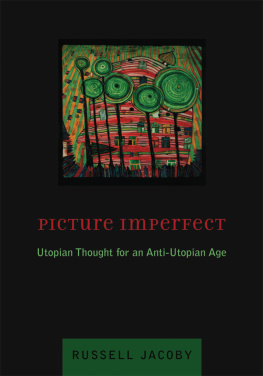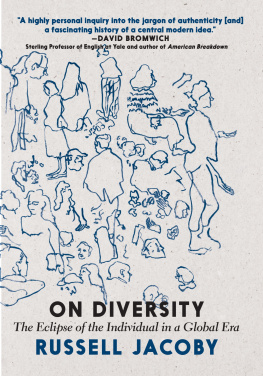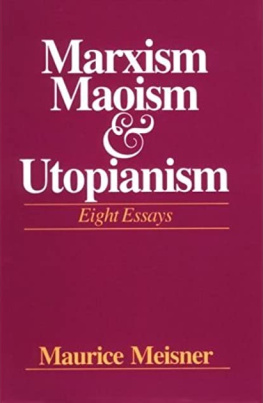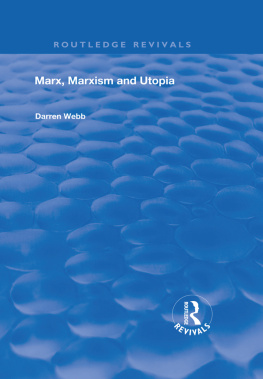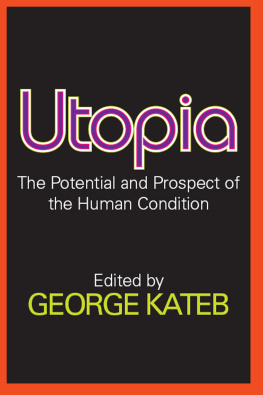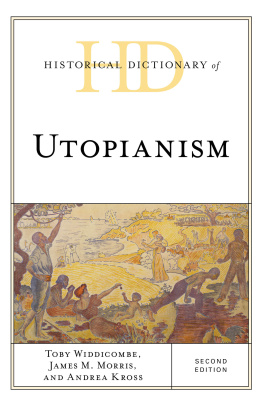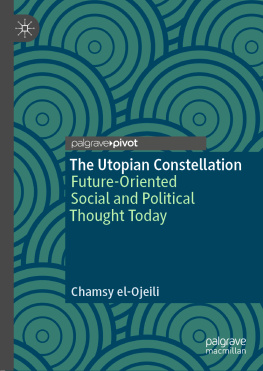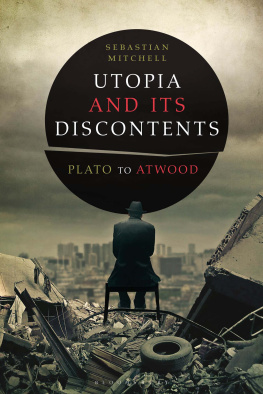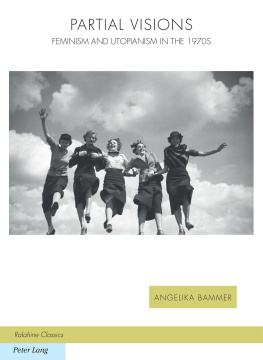PICTURE IMPERFECT
Also by Russell Jacoby
Social Amnesia: A Critique of Conformist Psychology from Adler to Laing
Dialectic of Defeat: Contours of Western Marxism
The Repression of Psychoanalysis: Otto Fenichel and the Political Freudians
The Last Intellectuals: American Culture in the Age of Academe
The Bell Curve Debate: History, Documents, Opinions (co-editor)
Dogmatic Wisdom: How the Culture Wars Divert Education and Distract America
The End of Utopia: Politics and Culture in the Age of Apathy
PICTURE IMPERFECT
Utopian Thought for an Anti-Utopian Age
Russell Jacoby
COLUMBIA UNIVERSITY PRESS
NEW YORK
Columbia University Press
Publishers Since 1893
New York Chichester, West Sussex
cup.columbia.edu
Copyright 2005 Columbia University Press
All rights reserved
E-ISBN 978-0-231-50297-9
Library of Congress Cataloging-in-Publication Data
Jacoby, Russell.
Picture imperfect : Utopian thought for an anti-utopian age / Russell Jacoby.
p. cm.
Includes bibliographical references and index.
ISBN 0231128940 (cloth : alk. paper)
1. Utopias. 2. Dystopias. 3. UtopiasReligious aspects. I. Title.
HX 806.J33 2005
335' .01dc22
2004043145
A Columbia University Press E-book.
CUP would be pleased to hear about your reading experience with this e-book at .
For Cristina
Contents
0UR MOST IMPORTANT TASK AT THE PRESENT MOMENT IS to build castles in the sky, wrote Lewis Mumford in his 1922 Story of Utopias. Four decades later he wondered how, in the wake of World War I, he could have expressed such upbeat sentiments. I was still living in the hopeful spirit of an earlier age, Mumford explained. He had been writing under the impetus of the great nineteenth century, with its fund of buoyant idealism and robust social enterprise.
Today only the historically obtuse can believe that to build castles in the sky is urgent. Buoyant idealism has long disappeared. In an age of permanent emergencies, more than ever we have become narrow utilitarians dedicated to fixing, not reinventing, the here and now. Yet the case can be made for writing against the grain of history, for writing under the impetus not of this but of a different period. In an era of intellectual triage, I attend the utopian esprit of another day.
Yet no one can jump over his or her historical shadow. Any study of the utopian spirit must engage its current status. Today most observers judge utopians or their sympathizers as foolhardy dreamers at best and murderous totalitarians at worst. The latter, not the former, charge concerns me. It relies on a reading of the historical recordindeed on a reading of the great anti-utopian novels such as 1984that is profoundly amiss. It relies on distending the category utopian to include any idea for a future society no matter how vicious or exclusionary. Every twentieth-century dictator from Hitler to Pol Pot and every twenty-first-century terrorist gets labeled a utopian. A recent exhibition of utopias in New York and Paris included photographs of an Israeli kibbutz and a Nazi concentration camp, as if each represented a viable utopia.
The utopian tradition may be diffuse, but here it vanishes into nothing and everything. Inasmuch as history saturates utopian thought, no single definition can fix its essence. Nevertheless, over the millennia, certain commitments have marked it consistently. From Greek and Roman ideas of a golden age to nineteenth-century fantasies of magical kingdoms, notions of peace, ease, and plenty characterize utopia; often they are linked to universal brotherhood and communal work. In Ovids age of gold the living creatures trusted one another. Cities did not stand behind high walls and bridges. Nor did the sound of clanging swords break the peace; the earth gave forth riches as fruit hangs from the tree.
I contest the notion that Nazi ideologues belong in this company. The Nazi preoccupation with racial purity, war, and nation shares nothing with classical utopian motifs. In his 1930 Myth of the Twentieth Century, a founding text of the Nazi Reich, Alfred Rosenberg may dream of a new human type and a new view of life, but Aryan purity and the German fist define this future. A people can still pull itself up out of political servitude, he writes, but never again from racial pollution. For Rosenberg, black or Jewish bastards were flooding Germany. They had to be eliminated. Just when an awakening Germany will reach the stage of carrying out a merciless cleansing with an iron broom and with ruthless discipline is uncertain. But, if anywhere, then in the preaching of remaining pure in race lies the holiest and greatest task. Even before the Nazis seized power, their ideologues came closer to calling for genocide than for utopian peace and brotherhood.
Nor can the more recent spate of global terrorism, often attributed to religious fanatics, be chalked up to utopians. Like communism, a defense department official informs us, radical Islam promises a utopia.
Qutb rejects paganism in all its formsliberalism, secularism, sexual openness, and, of course, Judaism. Most evil theories which try to destroy all values and all that is sacred to mankind are advocated by Jews. Where are the links to utopia?
To be sure, ideas about paradise, equality, and freedom also appear in the writings of radical Islamists like Qutb. Yet a few phrases, or even sentences and paragraphs, do not constitute a utopian vision. The issue is the larger spirit of radical Islam, and this is distant from classical utopias. You know that paradise is already beautified [for you] and the beautiful angels are calling you after they put on their most beautiful dresses, wrote Mohammad Atta, the lead hijacker in the September 11 attack on the World Trade Center, in his final message to his compatriots. His next sentence instructs them that if they have the honor of slaughtering a passenger, they should do so in the name of their parents and proceed by slitting the throat as in the ritual sacrifice of an animal. Compare this to Mores Utopia, chronologically five centuries earlier and spiritually ten centuries later, where religious tolerance was practiced and violence detested. Mores Utopia included sun worshipers and moon worshipers. Everyone was free to practice what religion he liked, and try to convert other people to his own faith, provided he did it quietly and politely, by rational argument.
I have no desire to exonerate utopians from each and every crime. I do wish that the broad brush that paints all utopians as terrorists and all terrorists as utopians be exchanged for a more precise tool. It is, for the most part, nationalist, ethnic, and sectarian passionsnot utopian ideasthat drive global violence. Where are the utopians in Rwanda, Sudan, Iraq, Northern Island, Sri Lanka, Palestine, and Israel? The struggles in these regions are about power, land, group identity, and religion. Yet utopian remains a convenient label for all those inflamed by ideas of nation, religion, and race.
I seek to outline the history of the modern anti-utopian animus. Ironically, anti-utopianism can be traced back to Thomas More, the originator of the term utopia. With the emergence of Luther and the upheavals of the Reformation, the Catholic More turned against the movement he believed he had helped initiate. The utopian More becomes the anti-utopian More, the bane of so-called heretics. Leading twentieth-century intellectuals such as Karl Popper, Isaiah Berlin, and Hannah Arendt followed in Mores footsteps inasmuch as they denounce a doctrine that once attracted them. First drawn to a vaguely utopian Marxism and then repelled by a palpably brutal Stalinism, these liberal anti-utopians advanced a critique of a larger totalitarian ideology. Totalitarianism became the catchall for utopianism as well as Marxism, Nazism, and nationalism. Today the liberal anti-utopians are almost universally honored; their ideas have become the conventional wisdom of our day. To the extent that their critique fits totalitarianism or Marxism or its deformations, I have no argument with them. To the extent that their critique blackens all of utopian thought, I object.

